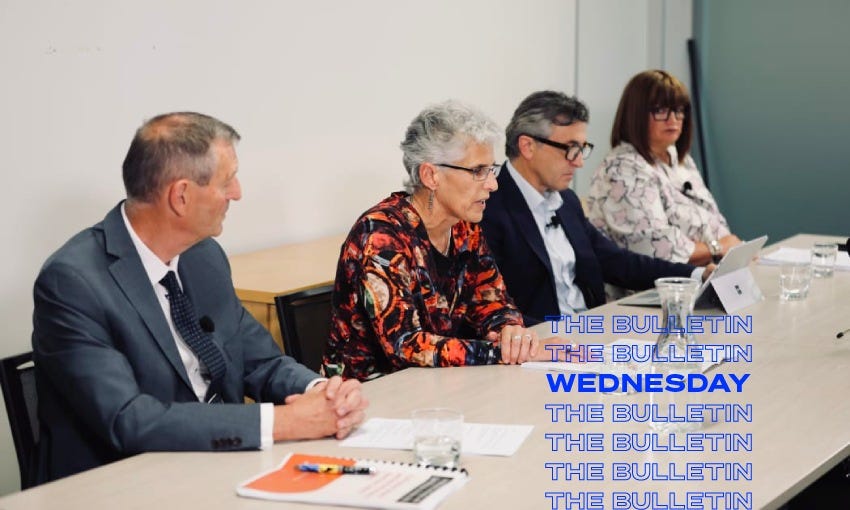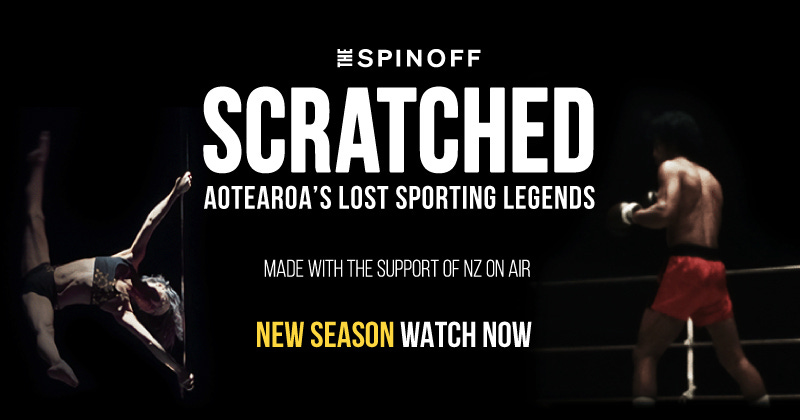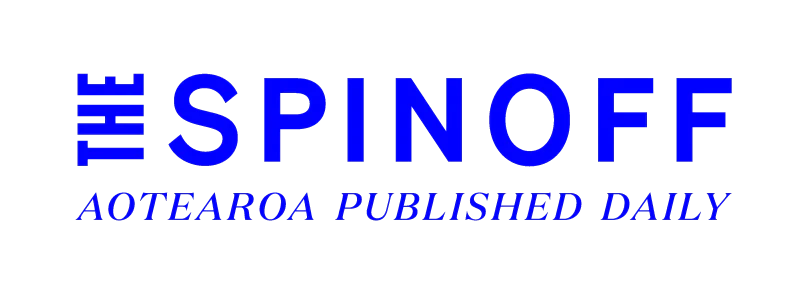The end of elite sports hubs?
A report into Cycling NZ and High Performance Sport NZ highlights a problematic feature of sports programmes, but CNZ says it’s not resourced to do anything else.
Mōrena and welcome to The Bulletin for Wednesday, May 18, by Anna Rawhiti-Connell. Presented in partnership with Z Energy.
In today’s edition: scale of disinformation during protests uncovered; Luxon responds to ERP; one pay equity deal down; but first the problems with high performance sport programmes.
Cycling NZ chairperson Phil Holden, Professor Sarah Leberman, Michael Heron QC and HPSNZ CEO Raelene Castle. (Photo: RNZ)
“A survey on Cambridge”
I visited athlete accommodation in Cambridge a few years ago. I hadn’t paid attention to the evolution of Cambridge as a base for high performance sports and my reference point for this kind of hot-housing of athletes was the 1984 movie about gymnast Nadia Comăneci. The accommodation seemed fine but was a far cry from the nostalgic view I had of our young medalist hopefuls training with old tires in their backyards, parents and siblings never too far away. Cambridge features throughout the Cycling NZ (CNZ) and High Performance Sport NZ (HPSNZ) inquiry report released on Monday. The Bounce’s Dylan Cleaver clocks it in his piece published on the Spinoff, saying the report is curiously also a survey on the small town where rents are high and everyone knows everyone else.
Days of the centralised cycling programme “surely numbered”
This isn’t a swipe at a small town, but a critique of a system that removes athletes from their support systems and puts them in high-pressure environments that don't suit everyone. 1 News sports reporter Abby Wilson writes that “the days of the centralised cycling programme for our top athletes in Cambridge are surely numbered”. Several CNZ regional development hubs were marked for closure in 2021. At the time, Sid Cummings, lead coach of the hub in Invercargill (which has just re-opened) said he wasn't sure what the development pathway would now look like but “it needs to be about the athletes first, over results and medals”.
Lather, rinse, repeat
This inquiry was initiated after the death of cyclist Olivia Podmore. Tragically, the 2018 Heron Report into the culture at CNZ also involved Podmore, with QC Mike Heron finding the young athlete was “pressured to give a false account” to protect a coach and another athlete who were allegedly involved in an intimate relationship. Champion rower Eric Murray says the latest report validates all of Podmore’s concerns. Stuff’s Dana Johannsen does not conceal her frustration at yet another report. She asks how it is that we are still reading things like “focusing on athletes as people first” in sports reviews. Alice Soper, writing for the NZ Herald (paywalled) skewers the very nature of the review process itself.
Punching above our weight at what cost?
The report states that “the centralised model has not been the panacea that some might have hoped it would be” and that “HPSNZ has advised that it is encouraging a more regional model, but CNZ advises it does not receive funding for such an approach and cannot afford it.” Funding will always be an issue in a small country but when funding is so closely linked to performance and we’re so very attached to the idea of “punching above our weight” and our per-capita medal tables, that comes at a cost. For the friends and family of Olivia Podmore, it’s more than anyone should be asked to bear.
The award-winning series Scratched: Aotearoa’s Lost Sporting Legends returns for a third season, celebrating five more New Zealand athletes whose incredible achievements have been forgotten by history.
The new season is available on The Spinoff today, with episodes recognising the feats of triathlete Erin Baker, the nine-time world champion who won 104 of the 112 races she competed in; Sheree Taylor, one of New Zealand’s first woman woodchoppers; pole dancing warrior Ryoko (Koko) Ibraki; Samoan-New Zealand professional boxer Ali Afakasi, who was tipped to become world champion; and track runner Marise Chamberlain, who competed in the 1964 Tokyo Olympics. Made with the support of NZ On Air.
The day misinformation channels defeated the mainstream media
On March 2, the last day of the protests at parliament, misinformation accounts on Facebook saw 357,089 interactions, while mainstream media pages generated 247,620. That’s according to new research from The Disinformation Project who analysed tens of millions of social media posts to uncover what they describe as a “tectonic shift in the country’s information and media landscapes”. Just 12 people, labeled the “New Zealand’s misinformation dozen” were responsible for almost three quarters of misinformation on Facebook. Telegram, a social media platform favoured by extremist organisations who’ve been banned from more mainstream platforms, grew its user base in New Zealand from 270,000 to more than 353,000 between late January and March 4.
No need for corporate welfare in ERP
Responses to the Emissions Reduction Plan continue with National leader Christopher Luxon saying taxpayers shouldn’t carry the cost of companies reducing their emissions, calling it “corporate welfare”. It might seem a bit odd, from a party traditionally known as being business-friendly, but it does make sense in the context of its cost of living messaging ahead of the budget tomorrow. He also said there was no need for corporate welfare because the Emissions Trading Scheme existed. The climate commission has said that the ETS scheme alone won’t get us to net zero emissions. Citing an ERP consultation document, interest.co.nz’s Brian Fallow writes that only relying on the ETS would require eye-wateringly high ETS prices.
One health worker pay equity deal gets over the line
In good news for some health sector workers, and I imagine DHBs, 10,000 health sector administration and clerical workers have struck an historic pay equity deal. Over 90 percent of the people in roles are women. For some, it means a 40% pay increase after years of being underpaid and four years of negotiations. Union delegate Nancy McShane said it brought tears to her eyes and that the settlement “will be profoundly transformational in the lives of my DHB admin colleagues". There are three pay equity negotiations still underway for nurses, allied health workers and midwives.
What young people hope for the future
A new research project has found young people hope for good health, independence, feeling safe, and stability. One of the participants, Ricky Reeves, who is legally blind, hopes for a time when driverless cars are a reality. Researcher Peggy Tombs said one of the main things she learned was that the very process of talking about hope led to young people feeling more hopeful. Among all the very heavy news, I thought that particular finding was a nice note for all of us. The research was funded by The Oakley Foundation and conducted by The Collaborative Trust.
Got some feedback about The Bulletin, or anything in the news? Get in touch with me at thebulletin@thespinoff.co.nz
You pop in to grab a single item and leave with $50 worth of stuff you didn't really need. Every. Single. Time. Alex Casey investigates the strange effect Chemist Warehouse has on so many of us; Simplicity managing director Sam Stubbs remembers finance legend Brian Gaynor; Auckland Museum curator Shaun Higgins shares some incredible shots from the new retrospective of west Auckland photographer Olaf Petersen; Catherine Woulfe recommends a pile of page-turners that got her through a long and crappy Covid recovery.
An essential item
Before we head into a very busy couple of days of budget coverage, after two days of ERP coverage, I will leave you with this report and headline from Stuff’s Brianna Mcilraith on why toilet paper isn’t on special anymore. An essential item that ap-plys to all of us.











